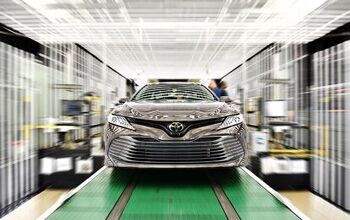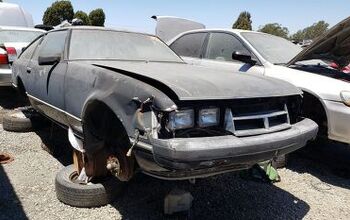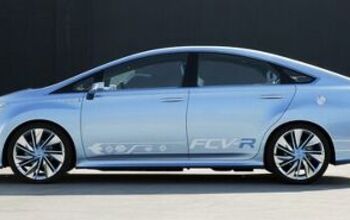Will Toyota Leave Japan?

For a while, TTAC has been tracking a strange story: Instead of exporting cars, Japanese carmakers (or should we call them factorymakers?) increasingly resort to exporting car factories. The higher and higher yen makes exports prohibitively expensive. On the other hand, a higher and higher yen buys more and more production capacity abroad. From Nissan to Mitsubishi, there is a chorus that sings the song that suddenly, people in low wage countries can make high quality cars. Now nobody would assume that Japanese carmakers plan a wholesale desertion of the land of Nippon, right? Wrong.
Today, we find an odd statement in The Nikkei [sub]: Toyota denies that they will leave Japan. At least not now …
According to Japan’s premium business wire, “Toyota Motor Corp is not considering hastily shifting production overseas despite the yen’s strengthening against the dollar, President Akio Toyoda said Monday.” Hmm. Did anyone suspect he would? Apparently, yes.
“We will not readily shift production outside of Japan, except in the most unusual circumstances,” said Akio Toyoda, probably in the direction of the Japanese government.
The most unusual circumstances might already be here. “Theoretically speaking, Toyota cannot afford to compete with its rivals,” Toyoda says.
They can easily compete if they shift production to low cost, soft currency countries, such as Thailand, or straight to the end user markets, such as the USA and Europe. In the latter case, the problem of how the foreign currency looks when converted into Japanese Yen remains. For that problem, there is another solution, which nobody dares to utter: Shift the headquarters abroad. A few years ago, large German companies made noises about moving their HQ into lower tax countries. Opel (make that GM Europe) actually moved to Switzerland. The German government got the message.
The Japanese government (with which the carmakers are a bit at odds) is probably thinking about what to make of Toyoda’s not so subtle hint.
PS: Did I mention that anyone who babbles about a soft Yen should have his head examined? Just in case I didn’t, I mention it again. Long term hospitalization is advised.

Bertel Schmitt comes back to journalism after taking a 35 year break in advertising and marketing. He ran and owned advertising agencies in Duesseldorf, Germany, and New York City. Volkswagen A.G. was Bertel's most important corporate account. Schmitt's advertising and marketing career touched many corners of the industry with a special focus on automotive products and services. Since 2004, he lives in Japan and China with his wife <a href="http://www.tomokoandbertel.com"> Tomoko </a>. Bertel Schmitt is a founding board member of the <a href="http://www.offshoresuperseries.com"> Offshore Super Series </a>, an American offshore powerboat racing organization. He is co-owner of the racing team Typhoon.
More by Bertel Schmitt
Latest Car Reviews
Read moreLatest Product Reviews
Read moreRecent Comments
- Honda1 Unions were needed back in the early days, not needed know. There are plenty of rules and regulations and government agencies that keep companies in line. It's just a money grad and nothing more. Fain is a punk!
- 1995 SC If the necessary number of employees vote to unionize then yes, they should be unionized. That's how it works.
- Sobhuza Trooper That Dave Thomas fella sounds like the kind of twit who is oh-so-quick to tell us how easy and fun the bus is for any and all of your personal transportation needs. The time to get to and from the bus stop is never a concern. The time waiting for the bus is never a concern. The time waiting for a connection (if there is one) is never a concern. The weather is never a concern. Whatever you might be carrying or intend to purchase is never a concern. Nope, Boo Cars! Yeah Buses! Buses rule!Needless to say, these twits don't actual take the damn bus.
- MaintenanceCosts Nobody here seems to acknowledge that there are multiple use cases for cars.Some people spend all their time driving all over the country and need every mile and minute of time savings. ICE cars are better for them right now.Some people only drive locally and fly when they travel. For them, there's probably a range number that works, and they don't really need more. For the uses for which we use our EV, that would be around 150 miles. The other thing about a low range requirement is it can make 120V charging viable. If you don't drive more than an average of about 40 miles/day, you can probably get enough electrons through a wall outlet. We spent over two years charging our Bolt only through 120V, while our house was getting rebuilt, and never had an issue.Those are extremes. There are all sorts of use cases in between, which probably represent the majority of drivers. For some users, what's needed is more range. But I think for most users, what's needed is better charging. Retrofit apartment garages like Tim's with 240V outlets at every spot. Install more L3 chargers in supermarket parking lots and alongside gas stations. Make chargers that work like Tesla Superchargers as ubiquitous as gas stations, and EV charging will not be an issue for most users.
- MaintenanceCosts I don't have an opinion on whether any one plant unionizing is the right answer, but the employees sure need to have the right to organize. Unions or the credible threat of unionization are the only thing, history has proven, that can keep employers honest. Without it, we've seen over and over, the employers have complete power over the workers and feel free to exploit the workers however they see fit. (And don't tell me "oh, the workers can just leave" - in an oligopolistic industry, working conditions quickly converge, and there's not another employer right around the corner.)































Comments
Join the conversation
Japan is ahead of the curve compared to it's Asian neighbors in preparing for the economic shifts in play. The rest of Asia is locked into the same old thinking of a continuing strong Dollar + a strong Euro while having their own currency weak for their export market. Over the next few years they will either have stronger currencies in Asia or we will have a currency/trade war. China is at center stage. Japan understands that trying to predict currency valuations and react is an act in futility. The time needed to make shifts take too long. In theory currency valuations should correct trade imbalances over time. So as these happen it can also quickly go the other way. So the Japanese thinking may be why not just establish operations in each key market as a "point of manufactiuring". Then change the percentage of production from either Japan or the alternative "point of manufacturing" depending on the currency valuations & commodities at the time. Now they have a 1-2 month reaction time instead of 1-2 years.
I'm more concerned about the fate of the smaller Japanese automakers. Toyota will be fine. Yes, they will move more production to other countries, but their heart is Japanese.